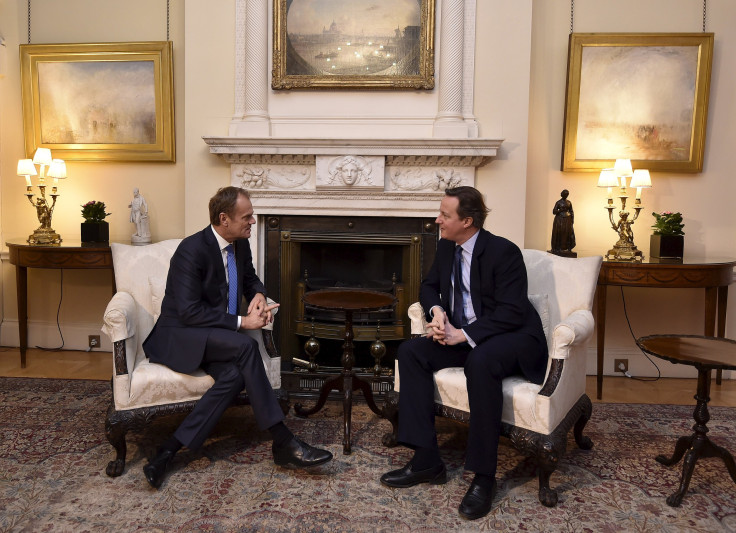Brexit: EU Member Countries To Get More Powers To Block Unwanted Laws; EU Releases Draft Proposal

UPDATE: 6:50 a.m. EST — The European Union’s draft agreement in its attempt to keep the United Kingdom within its fold was released Tuesday by EU President Donald Tusk.
British Prime Minister David Cameron called the draft document “real progress,” but it will need to be ratified by the member states at their meeting later this month.
Draft EU renegotiation document shows real progress in all four areas where UK needs change but there's more work to do.
— David Cameron (@David_Cameron) February 2, 2016
In its current form, the draft deal would allow Britain to request an emergency brake on benefits for migrant workers for up to four years, as a response to its “concerns about the exceptional inflow of workers from elsewhere in the European Union that it has seen over the last years.”
If approved, this measure, along with others, can be enforced as soon as the U.K. conducts its referendum over staying in the EU, which is expected to be held in June this year.
The Scottish National Party, which formed Scotland’s first majority government in 2011 and is expected to do so again, opposes the EU referendum. It also wants an independent Scotland as a part of the EU and held an independence referendum in 2014.
Original story:
According to a new draft deal in the negotiations between the United Kingdom and the European Union, national parliaments of member states will have the power to scrap unwanted EU laws. The proposals are set to be announced Tuesday by European Council President Donald Tusk.
A Sunday meeting between Tusk and U.K. Prime Minister David Cameron, to discuss British plans to reform its ties with the EU, did not yield satisfactory results, prompting another meeting Monday. Following that, sources in Cameron’s office told the media that a draft proposal to be published by Tusk on Tuesday will include a provision for member states to block EU legislation or demand changes to it.
Tomorrow around noon I will table proposal for a new settlement for #UKinEU. Good progress last 24 hours but still outstanding issues
— Donald Tusk (@eucopresident) February 1, 2016
In order to use so-called "red card," or the veto power, at least 55 percent of the EU’s 28 national parliaments would have to come together, the BBC reported. At present, parliaments of member states can issue a “yellow card,” which forces the European Commission to reconsider a law, or an “orange card,” which forces a law to be reviewed if more than half the parliaments object to it. The “red card” mechanism would be the first that allows parliaments of member states to entirely block EU legislation.
“This breakthrough will ensure that national parliaments’ voices are heard loud and clear in Brussels,” Reuters quoted the source in Cameron’s office as saying.
The draft proposals will need to be agreed upon by other EU members, who will meet for a summit on Feb. 18-19. Government sources in the U.K. believe that Eastern European member states, which have previously opposed changes asked for by Britain, would support the deal this time, the Telegraph reported.
The U.K. government reportedly wants to hold a national referendum on its membership of the EU in June this year, and is using that as leverage in its negotiations with the EU.
© Copyright IBTimes 2024. All rights reserved.





















